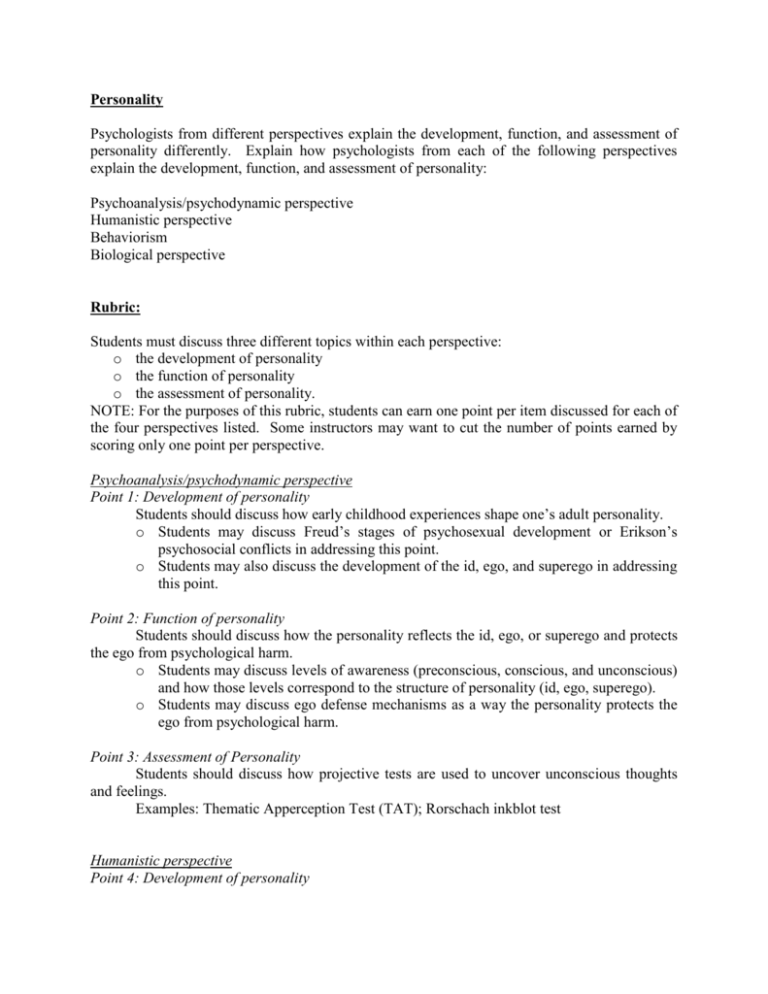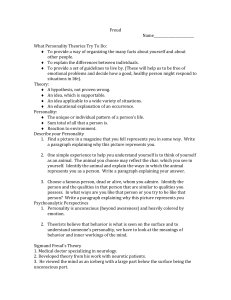Personality
advertisement

Personality Psychologists from different perspectives explain the development, function, and assessment of personality differently. Explain how psychologists from each of the following perspectives explain the development, function, and assessment of personality: Psychoanalysis/psychodynamic perspective Humanistic perspective Behaviorism Biological perspective Rubric: Students must discuss three different topics within each perspective: o the development of personality o the function of personality o the assessment of personality. NOTE: For the purposes of this rubric, students can earn one point per item discussed for each of the four perspectives listed. Some instructors may want to cut the number of points earned by scoring only one point per perspective. Psychoanalysis/psychodynamic perspective Point 1: Development of personality Students should discuss how early childhood experiences shape one’s adult personality. o Students may discuss Freud’s stages of psychosexual development or Erikson’s psychosocial conflicts in addressing this point. o Students may also discuss the development of the id, ego, and superego in addressing this point. Point 2: Function of personality Students should discuss how the personality reflects the id, ego, or superego and protects the ego from psychological harm. o Students may discuss levels of awareness (preconscious, conscious, and unconscious) and how those levels correspond to the structure of personality (id, ego, superego). o Students may discuss ego defense mechanisms as a way the personality protects the ego from psychological harm. Point 3: Assessment of Personality Students should discuss how projective tests are used to uncover unconscious thoughts and feelings. Examples: Thematic Apperception Test (TAT); Rorschach inkblot test Humanistic perspective Point 4: Development of personality Students should discuss how one’s own childhood development or need fulfillment contributes to personality. o Rogerian view: Childhood experiences help shape how congruent one’s life experiences are to one’s self-concept. o Maslowian view: The level of need fulfillment one has (hierarchy of needs) determines one’s personality. Point 5: Function of personality Students should discuss how personality serves to promote one’s self-concept and needs. o Rogerian view: Personality seeks to protect the self-concept from being incongruent with one’s experiences. Providing one with unconditional positive regard can help them figure out how to alleviate those incongruencies. o Maslowian view: Personality is driven by needs which are met according to a specific hierarchy. The highest need is self-actualization. Point 6: Assessment of Personality Students should discuss the individualistic nature of humanistic psychology, looking at the person to determine either the degree of incongruence with self-concept or the level of need one has. Behaviorism Point 7: Development of personality Students should discuss how early and current learning experiences reinforce behaviors that make up one’s personality. Point 8: Function of personality Students should discuss how one’s behaviors help determine personality. o Students may discuss the role of reinforcement and other consequences in helping one determine what behaviors to continue and which to cease (Skinnerian view). o Students can discuss Bandura’s reciprocal determinism theory. Point 9: Assessment of Personality Students should discuss how behaviorists would look at a person’s previous learning experiences and develop new experiences to counteract maladaptive behavior. Biological perspective Point 10: Development of personality Students should discuss how one’s genetic makeup determines personality (Eysenck’s view) or how successful adaptation (evolution) leads to certain dominant personality traits in humans (Buss’s view). Point 11: Function of personality Students should discuss how the “Big Five” personality traits may have developed through successful evolutionary interactions and serve to help certain types of traits be more successful than others. Point 12: Assessment of Personality Students should discuss how biological psychologists use twin studies to determine the level of similarity in personality among people.









